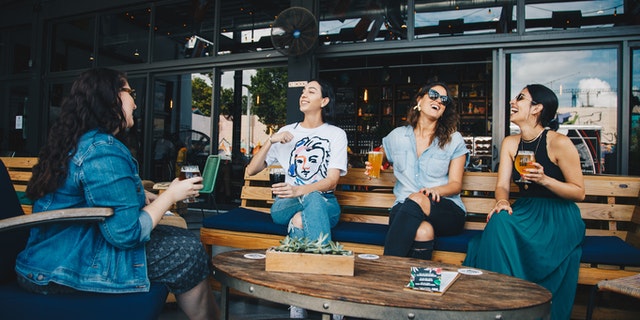
5 popular brands that use social proof in their marketing

If you were to ask most business owners what they hoped would happen with their brand when they first started out, you’d probably hear a few things: that it would turn into a household name and that customers would like the product enough to tell their friends.
You might know this concept as word-of-mouth marketing, but in psychology it’s recognized as social proof, the idea that consumers are more likely to follow the lead of others. Whether they’re consciously aware of it or not, many companies want to promote social proof in their campaigns to drive engagement — and some brands have done a great job at utilizing this psychology.
We’ve compiled a list of five established brands who have leveraged social proof tactics to help acquire customers.
1. Five Guys
If there was ever a brand that found great success after their humble beginnings, it’s Five Guys.
The giant burger chain originally started out as a hole-in-the wall type restaurant in Northern Virginia, relying on high-quality ingredients and brand advocates to bring in more hungry customers.
Their strategy panned out well. So well in fact that there are over 1,000 Five Guys fast-casual restaurants in the United States.
Five Guys continues to leverage social proof in its brick-and-mortar locations by covering the walls with copies of numerous awards, product reviews and articles.
2. Red Bull
Have you ever tried convincing customers that your brand is great by throwing your product in the trash? It might sound a bit wonky, but that’s exactly what Red Bull did. And it worked.
Hoping to create some buzz around their energy drinks in the late '80s, Red Bull placed empty cans in trash cans and outside of London nightclubs. Why? To convince partygoers and the general public that the product was a hit. If people saw empty cans everywhere they could only assume one thing: Everyone must be drinking Red Bull.
This is social proof marketing at its finest: creative, unexpected tactics that get the word out about a product and entice people to give it a try. Red Bull has continued on with similar marketing practices, sponsoring high-intensity events that are also designed to draw a large crowd and get people talking.
3. Zappos
Advertising might work wonders for some brands, but when it comes to Zappos, providing great customer service is their go-to tactic.
When Zappos made its debut in 1999, the online shoe retailer made the decision to focus its effort on creating a well-thought out customer experience instead of putting money toward advertising. They did so knowing that if they put their customers first, that choice would pay off in the long run.
They were right. By treating their customers well, their customers were inclined to return the favor. Zappo’s could count on their customers to repeatedly shop with them and spread the word about their great brand practices (some examples include buying a customer flowers after the death of a loved one and staying on a service call for nearly six hours while a customer shopped for items).
4. Chipotle
Mouth-watering food and sustainable practices have been great social proof tools for Chipotle.
Marketing experts know the value of having a deep understanding about who their customers are, and Chipotle’s team has gotten their customer persona down to a science. They also know what tactics to use to drive word-of-mouth among these personas.
Chipotle’s values are largely based around using the best ingredients possible and giving back to the planet in exchange for its resources. Both causes are important to the Chipotle customer base and the brand uses its brand messaging, digital marketing and video production to highlight these matters and get customers talking about them.
5. In-N-Out
A West Coast phenomenon, In-N-Out is universally known, and it’s all thanks to shared conversations between customers — new, old and soon-to-be.
Even if you haven’t made it out to one of the nearly 400 In-N-Out locations, you’re likely aware of their cult-following. Customers appreciate the West Coast feel of the burger chain and the tasty food. The brand’s exclusivity, coupled with rave reviews (a form of social proof) from customers who’ve enjoyed the food, help to heighten In-N-Out’s value.
In-N-Out is constantly praised for their burgers and fries, but it’s the menu items that aren’t regularly advertised that have people talking. Selections like their “Animal Style” and “3X3” burgers are part of In-N-Out’s secret menu, a brand response to the various out-of-the-box meal combinations loyal customers have requested. Because these items aren’t shown on a marquee or promoted in commercials, consumers only know they exist if a regular customer fills them in on the big secret.
Getting customers to tell friends and family how much they love your brand is a great marketing strategy, and it’s all possible thanks to consumer psychology. Social proof is the psychological principle that turns a likable brand into a loved brand, simply because everyone knows about it.

Lindsay Keener is a brand journalist for Quikly. She covers stories that help to inform and educate consumer-facing marketers.

